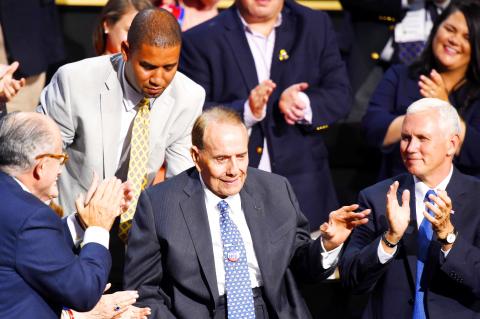The Ministry of Foreign Affairs yesterday downplayed reports that the government paid US$140,000 to a consultancy affiliated with former US senator Bob Dole, allegedly in exchange for his efforts to help establish high-level contact between Taiwanese officials and US president-elect Donald Trump’s staff that culminated in a historic telephone call between President Tsai Ing-wen (蔡英文) and Trump on Friday last week.
Dole has long been a significant friend of Taiwan who has assisted with communications between Taipei and the US Republican Party, the ministry said in a statement.
“The government is grateful for Dole’s strong friendship and adamant support,” the ministry said, declining to comment on a New York Times report that identified Dole as the facilitator of the call.

Photo: AFP
However, a few hours later, the ministry revised its position on Dole’s reported role, saying that none of the consultancies hired by the government played a part in setting up the call.
“It has been customary practice for the government to hire consultant firms to lobby for the nation. All related budgets have been subjected to legislative scrutiny and conformed with US laws,” the ministry said, citing as an example the representative office in the US’ retaining of Dole’s Washington-based law firm, Alston & Bird, since February 2003.
Citing documents filed with the US Department of Justice’s National Security Division as required by the Foreign Agents Registration Act, the New York Times on Tuesday reported that Alston & Bird had from May to October received US$140,000 from the government to coordinate with Trump’s campaign to set up a series of meetings.
“The disclosures suggest that Trump’s decision to take a call from the president of Taiwan, Tsai Ing-wen, was less a ham-handed diplomatic gaffe and more the result of a well-orchestrated plan by Taiwan to use the election of a new president to deepen its relationship with the United States — with an assist from a seasoned lobbyist well versed in the machinery of Washington,” the report said.
Separately yesterday, the Presidential Office criticized the report as incorrect and misleading, saying that the documents it cited did not include any specific plans about the Tsai-Trump call.
“The process to set up the telephone call between President Tsai and president-elect Trump followed standing procedure,” the office said, adding that it was not permitted to comment on the process nor details.
However, former minister of foreign affairs Chen Chien-jen (程建人) said the nation has been cultivating lobbyists in Washington for decades, investing in eight to 10 firms every year, and "[Taiwan's investing in public relations firms] is not a thing that emerged only in recent days," adding that the representative office in the US has had contract with this reported firm for at least ten years.
Lobbying is a prevalent practice in Washington, with tens of thousands of firms involved, Chen said, adding that Taiwan’s investment was “normal” compared with that of other nations, including Japan, Israel, China and other nations in the Middle East, Europe and Africa.
Democratic Progressive Party (DPP) Legislator Lo Chih-cheng (羅致政) called the report groundless, saying it was meant to blemish the Tsai-Trump call.
“The funds were for normal lobbying efforts and had nothing to do with the call,” Lo said, dismissing the possibility of the government spending money on lobbying just for a single telephone call.
Additional reporting by Chung Li-hua

A magnitude 7.0 earthquake struck off Yilan at 11:05pm yesterday, the Central Weather Administration (CWA) said. The epicenter was located at sea, about 32.3km east of Yilan County Hall, at a depth of 72.8km, CWA data showed There were no immediate reports of damage. The intensity of the quake, which gauges the actual effect of a seismic event, measured 4 in Yilan County area on Taiwan’s seven-tier intensity scale, the data showed. It measured 4 in other parts of eastern, northern and central Taiwan as well as Tainan, and 3 in Kaohsiung and Pingtung County, and 2 in Lienchiang and Penghu counties and 1

FOREIGN INTERFERENCE: Beijing would likely intensify public opinion warfare in next year’s local elections to prevent Lai from getting re-elected, the ‘Yomiuri Shimbun’ said Internal documents from a Chinese artificial intelligence (AI) company indicated that China has been using the technology to intervene in foreign elections, including propaganda targeting Taiwan’s local elections next year and presidential elections in 2028, a Japanese newspaper reported yesterday. The Institute of National Security of Vanderbilt University obtained nearly 400 pages of documents from GoLaxy, a company with ties to the Chinese government, and found evidence that it had apparently deployed sophisticated, AI-driven propaganda campaigns in Hong Kong and Taiwan to shape public opinion, the Yomiuri Shimbun reported. GoLaxy provides insights, situation analysis and public opinion-shaping technology by conducting network surveillance

Taiwan is gearing up to celebrate the New Year at events across the country, headlined by the annual countdown and Taipei 101 fireworks display at midnight. Many of the events are to be livesteamed online. See below for lineups and links: Taipei Taipei’s New Year’s Party 2026 is to begin at 7pm and run until 1am, with the theme “Sailing to the Future.” South Korean girl group KARA is headlining the concert at Taipei City Hall Plaza, with additional performances by Amber An (安心亞), Nick Chou (周湯豪), hip-hop trio Nine One One (玖壹壹), Bii (畢書盡), girl group Genblue (幻藍小熊) and more. The festivities are to

Auckland rang in 2026 with a downtown fireworks display launched from New Zealand’s tallest structure, Sky Tower, making it the first major city to greet the new year at a celebration dampened by rain, while crowds in Taipei braved the elements to watch Taipei 101’s display. South Pacific countries are the first to bid farewell to 2025. Clocks struck midnight in Auckland, with a population of 1.7 million, 18 hours before the famous ball was to drop in New York’s Times Square. The five-minute display involved 3,500 fireworks launched from the 240m Sky Tower. Smaller community events were canceled across New Zealand’s